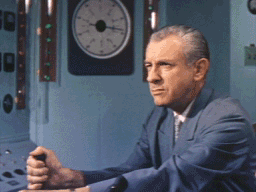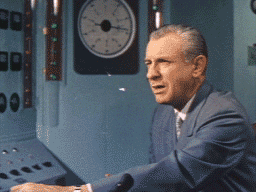Interesting video, but Starfleet doesn't disguise their weapons like that normally.
The Federation kinda does: they give their most powerful weapons to "explorers" operating deep space survey/science vessels. Though not exactly camouflaged, the idea in this case is that the explorers can be everywhere, and that the nation is a lot more comfortable funding a massive exploration fleet than a combat force, especially since the exploration fleet can take care of the combat if you need them to.
A better way is to go the way of the Society of Cinncinatus. Show the civil control of the military is a key element of said force, reinforce by oaths to the founding document, NOT to the principal political leader, and civil government that isn't based on conquest.
That's basically what they did in Babylon 5 and Mass Effect, with impressive results.
In the latter case, the Alliance Navy actually shows itself to be (IMO) a more effective exploration agency than Starfleet, especially since the Alliance has a set of very realistic and concrete exploration goals: identify natural resources, locate lost artifacts our friends are looking for, chart new planets
whether they're habitable or not, and smoke out any pirate scumbags you might stumble upon. During Wartime, their exploration goals shift to strategic concerns: "Find things that could give us an advantage against the enemy." They even have the famous "Alliance Exploration Flotilla" that specializes in this sort of thing.
Deeds matter more than words, and hiding things like that are pretty loud voices suggesting false flag and other hidden aggression. It makes the UFP sound like a protection racket.
Which is why the Federation doesn't hide its weapons, it just keeps them under the control of a non-military agency which is forever dedicated to what seem to be peaceful purposes. Take the video from above and insert a context: a nation with a large government-owned freight corporation, where most of the freighter captains and freight train engineers are part of a large government agency. Their main job is to haul freight and ensure efficient commerce, but the government also has them carry at all times at least one container with a weapon system.
This would basically be a modernized spin on the traditional "militia," civilians whose right to "keep and bear arms" basically includes Exocets and cruise missiles. Scary as that is, the fact that in the Trek universe most commercial transports, ships and even cities can be equipped with forcefield defenses adequate to defend against misuse of those weapons might make that idea somewhat more tenable. It MUST, in fact, due to the implications of replicator technology and the tech level involved: 24th century science is advanced enough that a high school kid could construct a nuclear warhead on his own over a single afternoon, and some method of quickly detecting, disarming or defending against such shenanigans would be inherent in a secure society.
That still doesn't explain how a ship like Voyager would immediately default to a mission of exploration the moment their ASSIGNED mission is completed.
Oh that one's easy: Janeway is insane.
Not that I disagree with this in any way shape or form... but if that's the case, why did Starfleet promote her to Admiral???

Which is weird, because "checking on remote colonies, investigating lost colonies and ships, dealing with diplomatic crisis" also falls under the category of "exploration."
You and I have very different definitions of "exploration".
Not so much. Traditional navy expeditions have followed this pattern as well; the search for the lost Roanoke Colony, for example, or the Navy expedition to make first contact with Japan. The Apollo-Soyuz test project was arguably more of a diplomatic mission than an exploration one, as was the shuttle mission to the Mir, to a certain extent, a relief mission for the space station and an olive branch to the Russians. Poilitical outreach and diplomacy has been one of NASA's unofficial missions for several decades.

 The motto of the show is misleading!
The motto of the show is misleading! 





